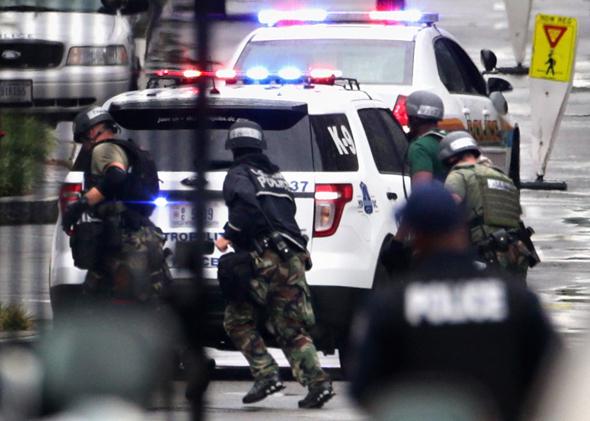We can’t have all the freedom we insist on in this country. We can’t have near total access to guns and no way to track people with mental illness—along with a system for treatment so riddled with holes that’s barely a system at all. The combination—our approach to guns crossed with our approach to mental illness—is deadly. And however unlikely it is that the senseless Washington Navy Yard massacre will actually change anything, I have to howl one more time.
In hindsight, Aaron Alexis was a walking alarm bell. He called the police to a Rhode Island hotel room where he was staying in August to say that mysterious people connected to an argument he’d had at an airport were “harassing him with a microwave machine and ‘speaking to him through the wall.’ ” He’d been investigated by police in Texas for shooting through his ceiling into his neighbor’s apartment and by police in Seattle for shooting out a car’s tires. About the second incident, he said he couldn’t remember what had happened because he’d blacked out. Alexis was a military veteran with an honorable discharge, though he almost got a lower classification for a “pattern of misbehavior.” He went to a Veterans Affairs hospital asking for treatment, but he said his problem was insomnia, and no one flagged him for commitment or continued treatment, as far as we now know.
Lots of dots, never connected. To members of Congress, the missed warning signs are reasons to tighten the process for receiving a security clearance at military installations. But that doesn’t even count as a finger in the dike. Let’s say tightening the rules for clearance would make the Navy Yard safer—what about everywhere else Alexis could have opened fire? There is a much broader, deeper question at the root of this tragedy: Why are we so attached to the right to own a gun that we allow people with criminal histories and mental illness to carry them, while doing nowhere near enough to make sure they get the care they need?
By now, what’s most depressing is how familiar it feels. After the mass shootings in Newtown, Conn.; and Aurora, Colo.; and Tucson, Ariz.; and Virginia Tech—all by young men with untreated mental illness—we had the same national debate. I want to make sure to say, as I always do, that mentally ill people very rarely unleash terrible violence. The Bazelon Center for Mental Health Law (Disclosure: It’s named in memory of my grandfather) objects to focusing on people with psychiatric illness in the wake of shootings, because “mental illness by itself is not statistically related to violence.” Untreated mental illness, however, is a risk factor. Mother Jones did a service in 2012 by analyzing 62 mass shootings, 25 of them in the past seven years. The central finding:
Nearly 80 percent of the perpetrators in these 62 cases obtained their weapons legally. Acute paranoia, delusions, and depression were rampant among them, with at least 36 of the killers committing suicide on or near the scene. (Seven others died in police shootouts they had little hope of surviving, regarded by some experts as “suicide by cop.”) And according to additional research we completed recently, at least 38 of them displayed signs of possible mental health problems prior to the killings.
Add Alexis and make that 39 out of 63—close to two-thirds. So what do we do? I turned on Fox on Tuesday night, heard someone rail against the mentally ill, and couldn’t bear to keep listening. I don’t want to get near anything that smacks of a witch hunt against a group that’s already discriminated against. The hard part here—and it’s really hard—is that to keep guns out of the hands of the mentally ill specifically, as opposed to making it harder for everyone to own them, the government has to decide who the mentally ill are. You don’t have to be paranoid to worry about the creation and keeping of such a list. Who gets on it, and on what basis? What else could it be used for? After Newtown, as the Wall Street Journal’s Law Blog points out:
New York passed a law that requires physicians, psychologists, nurses and clinical social workers to warn health officials about potentially dangerous patients, who then may be forced to surrender their guns without a court hearing. Mental-health professionals balked at the New York law, fearing it would tread on confidentiality and put the therapist and patient in an adversarial relationship.
I share those doubts. But here’s the other side of the coin: At the moment, the federal government can’t enforce the far milder gun restrictions that Congress enacted in 2008 after the Virginia Tech shooting that make it illegal to sell a gun to anyone “adjudicated as a mental defective.” That law’s limited reach is blocked by the states that don’t report the names of people covered by it (mostly those who have been involuntarily committed to a mental hospital) to the national database for background checks. That’s how skittish some parts of the country are about any kind of gun regulation.
And the federal law banning guns for the “mentally defective” wouldn’t have applied to Alexis or the Aurora or Newtown or Tucson shooters anyway. None of them had ever been involuntarily committed. That’s our stalemate. To some of us, it would be a frightening loss of freedom for the government to track people who seek mental health treatment. To other people, it’s a frightening loss of freedom for the government to make guns harder for everyone to buy. So we have lots of freedom and also lots of death. Time after time.
